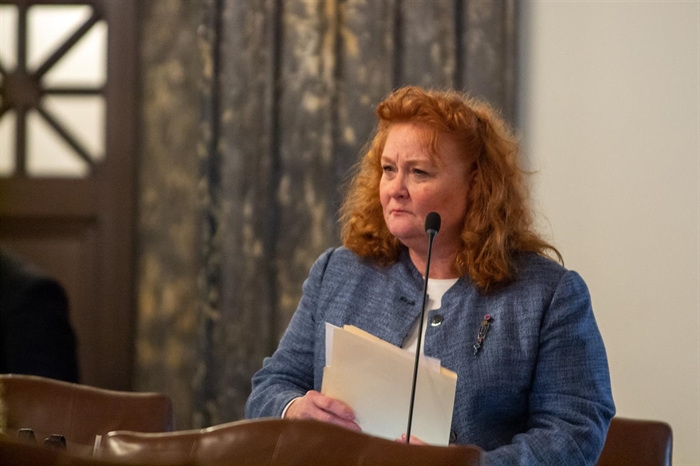
Bill hailed as first step toward broader ethics reform
By Andrew Adams
Capitol News Illinois
Lawmakers in Springfield have unanimously approved a measure that would place new restrictions on the red-light and speed camera industry’s involvement in state and local elections and government.
House Bill 3903 would ban automatic traffic enforcement companies or their officers from donating to candidates for public office at the state and local level. It would also prevent state and local government officials from accepting jobs or contracts with those companies while in office or for two years after leaving office, a kind of “revolving door” ban.
Sponsors praised the bill as much-needed ethics reform after several public officials in the past decade have been caught by federal investigators engaging in bribery deals and kickback schemes involving red-light camera companies.
“What this does is it tightens up the ethics surrounding the red-light camera corruption and scandals,” Rep. Bob Rita, D-Blue Island, said during the House debate on Thursday.
Rep. Patrick Windhorst, R-Metropolis, called the two-year revolving door ban “a good step.”
HB 3909 received unanimous approval in the House on Thursday after a similar unanimous vote in the Senate last week.
The bill would also grant the Illinois Department of Transportation new authority to review and either approve or revoke approval for automated traffic enforcement systems under certain circumstances, such as if a public official is charged with bribery.
The measure would also require that local governments review the safety impacts of automated enforcement systems every two years. Local governments would also have the sole authority to decide to issue tickets, ending their current ability to delegate that decision to the red-light and speed camera companies they contract with.
Bribes in the legislature, local government
The spate of indictments and convictions of public officials caught up in bribery schemes with automated traffic enforcement companies was alluded to during debate on the bill at the Capitol.
“We’ve had issues with this and I think the bill is a great first step,” Sen. Jil Tracy, a Quincy Republican and member of the legislature’s ethics commission, said.
Tracy has seen two of her Senate colleagues indicted on such charges in the last four years.
In September of last year, Sen. Emil Jones III, D-Chicago, was charged with bribery for a scheme connecting him to red-light camera company SafeSpeed LLC in exchange for shielding the organization from a study of red-light systems in the state. Jones has pleaded not guilty and remains in the Senate. He voted in favor of the measure last week.
The late Sen. Martin Sandoval, D-Chicago, also admitted to accepting bribes from the company and falsifying tax returns in 2020. Sandoval died of COVID-19 complications later that year while he was awaiting sentencing.
“The public deserves to have the utmost trust in their government and their law enforcement,” bill sponsor Sen. Laura Murphy, D-Des Plaines, said in a news release. “We need to ensure that there is accountability and honesty on all levels.”
Two former suburban Chicago mayors, a former Cook County commissioner and his chief of staff have also pleaded guilty to charges involving bribes or kickbacks from SafeSpeed.
In 2016, former assistant Chicago transportation commissioner John Bills was convicted of accepting lavish gifts and $600,000 in exchange for pushing the city to accept contracts from the red-light camera company Redflex. Bills received a 10-year prison sentence, the longest sentence so far handed down to an Illinois official in connection with a red-light camera company. Federal prison records show he’s moved on to a halfway house.
A first step?
The General Assembly is facing pressure to enact ethics reforms in response to federal probes beyond those involving red light camera companies. Earlier this month, three ex-lobbyists and the former CEO of electric utility Commonwealth Edison were convicted of orchestrating a bribery scheme to curry favor with former House Speaker Michael Madigan, who was himself indicted on related corruption and racketeering charges last year.
In mid-May, former Democratic Gov. Pat Quinn made an appearance in Springfield to call for a special legislative session to consider ethics reform, noting that the ComEd verdict revealed a “grievous breach of public trust.”
“If you take a look at the indictments that have been made that are going to be tried next year, the allegations include violations of conflict of interest,” Quinn said. “That’s just not right. It’s not right for anybody in Illinois who’s a taxpayer to have legislators voting on bills where they have a financial interest.”
Ryan Tolley, the policy director for the government reform group CHANGE Illinois, noted that HB 3909 marks the first time the legislature has enacted a two-year revolving door ban, an idea that was contentious even when the General Assembly passed a six-month ban on lawmakers leaving for lobbying gigs in 2021.
“Hopefully this can be a first step moving forward,” Tolley said in an interview.
Tolley noted that he believes further action is needed on ethics reform, such as giving the Legislative Inspector General, the General Assembly’s top ethics official, more independent authority to investigate potential wrongdoing.
Former LIG Carol Pope cited her lack of power to conduct investigations or impose sanctions as a reason for her 2021 resignation, calling the office a “paper tiger.”
Capitol News Illinois is a nonprofit, nonpartisan news service covering state government. It is distributed to hundreds of print and broadcast outlets statewide. It is funded primarily by the Illinois Press Foundation and the Robert R. McCormick Foundation, along with major contributions from the Illinois Broadcasters Foundation and Southern Illinois Editorial Association.

